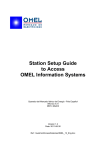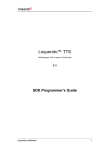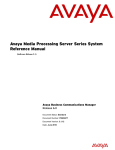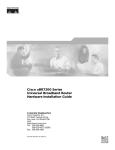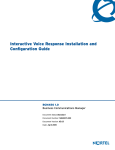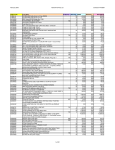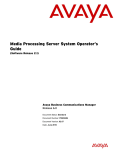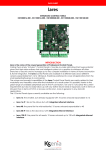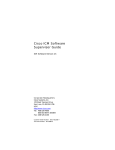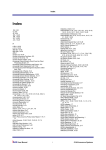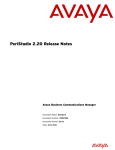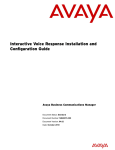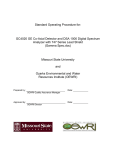Download Avaya Media Processing Server
Transcript
Avaya Media Processing Server
Release 4.1
Release Notes
Document Release 1.1
August, 2013
Avaya Media Processing Server 4.1
Contents
Introduction ............................................................................................................ 4
Installation Requirements...................................................................................... 5
Hardware Specifications................................................................................................ 5
Software Requirements ................................................................................................. 7
Operating System Requirements ................................................................................ 7
Solaris 10 Patch Level Requirements ......................................................................... 8
Windows Patch Level Requirements........................................................................... 9
MPS 4.1 General Availability (GA) Release Information ................................................ 9
MPS 4.1 Installation ...................................................................................................... 9
MPS 3.5 SCE Installation ............................................................................................ 10
Interoperability ..................................................................................................... 11
CCTIVR ...................................................................................................................... 11
Speech Server Third-Party Speech Engines ............................................................... 11
Databases ................................................................................................................... 12
JAVA ........................................................................................................................... 12
JBOSS ........................................................................................................................ 12
OpenSSL .................................................................................................................... 13
Other Interoperability................................................................................................... 13
New Features in MPS 4.1 ..................................................................................... 14
Speech Server ............................................................................................................ 14
Nuance Speech Server 6.2 MRCPv1 ........................................................................ 14
Loquendo 7.2 MRCPv1 ............................................................................................ 14
VocalPassword 8.3 ................................................................................................... 14
Co-resident MRCPv1 Client and Application Processor ............................................ 15
Web Services Support for MPS Developer .................................................................. 15
Native WAV File Support............................................................................................. 16
Avaya Self Service Optimization Support .................................................................... 17
CCSS SIP ................................................................................................................... 17
SIP Update Method Support ..................................................................................... 17
Host Protocols............................................................................................................. 18
Cisco ICM GED 125 Spec 3.0d Support ................................................................... 18
MPS Alternative Host Name Configuration .................................................................. 18
Tools ........................................................................................................................... 19
MPS Backup and Restore Scripts ............................................................................. 19
Packaged Third-Party Applications ............................................................................. 20
Avaya MPS 4.1 Release Notes
2
Avaya Media Processing Server 4.1
Wireshark Network Protocol Analyzer for Windows .................................................. 20
Updates to Features and Serviceability.............................................................. 21
Speech Vendor Release Updates ............................................................................... 21
MPS 4.1 Licensing Support ......................................................................................... 22
MPS Log Utility ........................................................................................................... 23
Interactive Mode (mpslog) ........................................................................................ 23
Non-Interactive Mode (mpslog) ................................................................................. 24
Java Support ............................................................................................................... 24
Support for Java 6 and Java 7 .................................................................................. 24
CCSS SIP ................................................................................................................... 25
SIP DLOG Logging and Configuration ...................................................................... 25
SIP Trace/Block/Unblock/Reset Command Updates................................................. 25
Toolkits ....................................................................................................................... 26
Discontinued H.323 and Video Server Toolkits ......................................................... 26
TCAD TMS Trace Using DLOG................................................................................... 26
PVI Checker ................................................................................................................ 26
Changes on the Windows Platform ........................................................................... 26
Changes on the Solaris Platform .............................................................................. 27
Relational Database (RDB) ......................................................................................... 27
Discontinued Support for CORBA in RDB................................................................. 27
Host Protocols............................................................................................................. 27
Discontinued Support for Brixton LU 6.2 Host Protocol ............................................. 27
Field Factory Tests...................................................................................................... 27
Security Enhancements ....................................................................................... 28
PTELNET SSL Support ............................................................................................... 28
HTTP Support for Apache and ZAG Tools .................................................................. 28
MPS Manager Secure Sockets Layer (SSL) Support .................................................. 29
HTML and VXML SSL Mutual Authentication Support ................................................. 30
MPS Reporter SSH Support ........................................................................................ 30
ZAP SSH Configuration............................................................................................... 31
OS Hardening Scripts ................................................................................................. 31
Known Issues ....................................................................................................... 33
Nuance 10 MRCPv1 Issues ...................................................................................... 33
MPS Developer Web Services Issues....................................................................... 34
VXML Application Lines Limitation ............................................................................ 35
Invalid SIP Trace/Block/Unblock/Reset Commands Ignored ..................................... 36
Contact information ............................................................................................. 37
Avaya MPS 4.1 Release Notes
3
Avaya Media Processing Server 4.1
Introduction
The Avaya Media Processing Server (MPS) 4.1 release offers significant improvements
over MPS 3.5.
The following are the main changes:
•
MPS 4.1 runs on more powerful late-model Solaris and Windows servers.
•
MPS 4.1 runs on the Windows 2008 R2 64-bit operating system.
•
MPS 4.1 provides improved network security by implementing OS hardening of its
network interfaces and blocking unwanted network traffic.
•
MPS 4.1 provides improved data security by using Secure Sockets Layer (SSL)
and Secure Shell (SSH) encrypted connections for many of its server-to-server
interfaces.
•
MPS 4.1 supports Java 7, while retaining support for Java 6.
•
MPS Speech Server adds support for MRCPv1-based Nuance 10, Vocalizer 5.7
and Loquendo 7.2 speech engines running on Red Hat Enterprise Linux 6.2, and
supports newer releases of other third-party speech engines.
•
MPS4.1 supports MPS Speech Server MRCPv1 client on Solaris 10.
•
MPS Developer provides a resource and a toolkit for accessing external Web
Services using SOAP/WSDL standards.
•
MPS AP can play WAV files from the local file system or a remote server using a
URL, without using an Internet Audio Server resource.
•
MPS 4.1 improves logging capabilities in many components.
•
MPS 4.1 simplifies command-line administration and logging commands.
Important MPS 4.1 Licensing Requirement
MPS 4.1 does not support license keys from previous MPS releases. Avaya provides MPS
4.1 license keys with every new MPS 4.1 system and with MPS 4.1 software upgrades. If
MPS 4.1 license keys are not delivered with your MPS 4.1 order, contact Avaya support for
new license keys. For details on the licensing changes, see MPS 4.1 Licensing Support.
Avaya MPS 4.1 Release Notes
4
Avaya Media Processing Server 4.1
The following sections document MPS 4.1 installation requirements, new features and
other improvements.
Installation Requirements
This section provides the requirements for MPS 4.1 installation, and for pre-installed
systems.
Hardware Specifications
MPS 4.1 is supported on Sun/SPARC servers and on Microsoft Windows servers. Some
newer server models are supported, while support for some older models is discontinued.
The change in hardware support is the result of a lack of availability of replacement parts
such as memory and disk drives.
Sun/SPARC server models:
Sun/SPARC models
(Solaris 10)
V210
V240
V210 RoHS
V240 RoHS
Netra 240
Netra 240 RoHS
V215
V245
T2000
T5120 (AC)
T5120 (DC)
T5220
Netra T4-1 (AC)
Netra T4-1 (DC)
MPS 4.1
Supported?
No *
No *
No *
No *
Yes
Yes
Yes
Yes
Yes
Yes
Yes
Yes
Yes
Yes
* Servers marked ‘No’ (not supported) were
supported for MPS 3.5, but the purchase of a new
server is required for an upgrade to MPS 4.1.
Support for these older server models is discontinued
because of a lack of available replacement parts.
Avaya MPS 4.1 Release Notes
5
Avaya Media Processing Server 4.1
Windows server models:
Windows server
models
X335
X336
DL360
X336 RoHS
DL360 G4p RoHS
X3550
X3550-H
DL360 G5
DL360 G5-H
DL360 G7
DL360 Gen 8
X3550 M4
MPS 4.1
Supported?
No *
No *
No *
No *
No *
Yes
Yes
Yes
Yes
Yes
Yes **
Yes **
* Servers marked ‘No’ (not supported) were
supported for MPS 3.5, but the purchase of a new
server is required for an upgrade to MPS 4.1.
Support for these older server models is
discontinued for lack of available replacement parts.
** New servers running Windows 2008 R2 only (not
Windows 2003).
MPS 4.1 runs only on Solaris and Windows. However, the MPS 4.1 Speech Server client
on Solaris or Windows can use MRCPv1 to communicate with 3rd-party speech-processing
engines hosted on Red Hat Enterprise Linux 6.2 servers or on Windows Servers (Nuance
Speech Server with Nuance 10/Vocalizer 5.7; or Loquendo 7.2 Speech Server).
MPS supports the following server models using MRCPv1 speech engines hosted on Red
Hat Enterprise Linux 6.2:
Red Hat Enterprise Linux Servers
(Nuance & Loquendo MRCPv1 Speech Servers)
X3550
X3550-H
DL360 G5
DL360 G5-H
DL360 G7
DL360 Gen 8
X3550 M4
Avaya MPS 4.1 Release Notes
6
Avaya Media Processing Server 4.1
Software Requirements
This section provides the software requirements.
Operating System Requirements
Table 1 - Operating Systems
Operating System
Server Type
Solaris 10
Microsoft Windows 2008 R2 (64-bit)
Microsoft Windows 2003 Server
Microsoft Windows 2003 R2 ***
MPS Management Workstation
Solaris 10
and
Microsoft Windows 2008 R2 (64-bit)
MPS Developer Tools
Microsoft Windows 2003 Server
Microsoft Windows 2003 R2 ***
Microsoft Windows 7 ***
Microsoft Windows XP ***
Solaris 10
CCSS Session Initiation Protocol Server
Solaris 10
(CCSS SIP Server)
Microsoft Windows 2008 R2 (64-bit)
Microsoft Windows 2003 Server
Microsoft Windows 2003 R2 ***
Microsoft Windows 2008 R2 (64-bit)
Microsoft Windows 2003 Server
Microsoft Windows 2003 R2 ***
Microsoft Windows 2008 R2 (64-bit)
Microsoft Windows 2003 Server
Microsoft Windows 2003 R2 ***
MPS Application Processor
CCSS Signaling System 7 Server
(CCSS SS7 Server)
CCTIVR Server
Speech Server
MPS API-based Client
Avaya MPS 4.1 Release Notes
7
Avaya Media Processing Server 4.1
Operating System
Server Type
API-based Speech
Server **
MPS MRCPv1 Client *
MRCPv1 Speech Server
**
Microsoft Windows 2008 R2 (64-bit)
Microsoft Windows 2003 Server
Microsoft Windows 2003 R2 ***
Solaris 10
Microsoft Windows 2008 R2 (64-bit)
Microsoft Windows 2003 Server
Microsoft Windows 2003 R2 ***
Microsoft Windows 2008 R2 (64-bit)
Microsoft Windows 2003 Server
Microsoft Windows 2003 R2 ***
Red Hat Enterprise Linux 6.2
* On Windows and Solaris 10 operating systems the MPS 4.1 MRCPv1 client
can be installed either alone or with an MPS AP co-resident.
** Speech server vendor software support varies by software release and
operating system. Nuance Speech Server 6.2, Nuance10 Recognizer and
Vocalizer 5.7 only support Windows 2008 R2. For more details see the
following documents available from http://support.avaya.com:
Avaya MPS Speech Server Nuance 10 and Vocalizer 5.7 MRCPv1
Supplement
Avaya MPS Speech Server Loquendo 7 MRCPv1 Supplement
Migrating Avaya Media Processing Server from 3.x to 4.1 (NN44100-413)
*** Only available in customer-supplied Platform Vendor Independence (PVI)
configurations.
Solaris 10 Patch Level Requirements
The minimum Solaris 10 patch levels for MPS 4.1 are carried forward from MPS 3.5:
Solaris 10 patch 137147-04 or higher
Avaya MPS 4.1 Release Notes
8
Avaya Media Processing Server 4.1
Solaris 10 patch 119963-12 or higher (required for systems that use
VoiceXML Interpreter)
For Solaris 10 systems being upgraded to MPS 4.1 from MPS 3.x, Avaya recommends that
you apply patch 147440-25 (Solaris 10 OS Patch Bundle R27 Kernel Patch) prior to
performing the upgrade.
Windows Patch Level Requirements
The minimum Windows patch levels for MPS 4.1 are:
Service Pack 2 on Windows 2003 systems.
Service Pack 1 on Windows 2008 R2 systems.
MPS 4.1 General Availability (GA) Release Information
Solaris
The GA release for Solaris includes the base Solaris packages with cut date 20130703
(July 3, 2013), and the following additional patches:
globl4.1.0.1
ccss7.1.0.1
view4.1.0.1
ws4.1.0.1
Windows
The Windows GA release, version 4.1.0.041 20130703, was created July 3, 2013.
Avaya_SelfService_4.1.0.041-20130703.exe installs the MPS base packages. The GA
release for Windows also includes the following additional patches:
globl4.1.0.1
ccss7.1.0.1
view4.1.0.1
ws4.1.0.1
pdp4.1.0.1
MPS 4.1 Installation
Avaya Media Processing Server 4.1 Packages
Avaya MPS 4.1 Release Notes
9
Avaya Media Processing Server 4.1
The MPS 4.1 software release can be installed on an MPS Application Processor (MPS
AP), a Common Channel Signaling Server (CCSS) SS7 or SIP server, MPS Speech
Server, MPS Communications Control Toolkit Interactive Voice Response (CCTIVR)
server, and all MPS Tools workstations.
The following documents detail MPS 4.1 installation on Solaris and Windows:
Installing Avaya Media Processing Server Software on the Solaris Platform (NN44100-303)
Installing Avaya Media Processing Server Software on the Windows Platform (NN44100304)
The following document details upgrading an MPS 3.x system to MPS 4.1, and verifying
the upgrade:
Migrating Avaya Media Processing Server from 3.x to 4.1 (NN44100-413)
Avaya Speech Server Software
Speech Server resources contain products from third-party vendors. Each speech resource
requires that you install the following software:
Avaya Software: This includes Speech Server resource processing
software installed by the MPS 4.1 installer. For information on how to
install MPS 4.1 software on a Speech Server, see the Avaya Media
Processing Server Speech Server Installation Guide (NN44100- 305).
Vendor Software: This contains the speech recognition or synthesis resource
processing software. Vendor-specific patches are installed with the vendor
software on the Speech Server. For more information, refer to the vendor’s
documentation.
Apache Web Server: For information about how to install Apache Web Server,
see the Avaya Media Processing Server Speech Server Installation Guide
(NN44100-305).
MPS 3.5 SCE Installation
MPS 4.1 does not include a new release of Service Creation Environment (SCE). MPS
4.1 retains compatibility with MPS 3.5 SCE. MPS 3.5 SCE cannot be co-resident with
MPS 4.1 software. MPS 3.5 SCE software can be installed using the procedures
described in the Avaya Service Creation Environment Installation Guide (NN44300-303).
Avaya MPS 4.1 Release Notes
10
Avaya Media Processing Server 4.1
Interoperability
MPS 4.1 maintains the capability to interoperate with other Avaya products and third-party
products. As new releases of the products with which MPS interworks have been made
available, MPS 4.1 has been verified to work with many of those new releases.
Solutions involving MPS interworking with other platforms come in many possible
configurations. Avaya provides a matrix, in Microsoft Excel spreadsheet format, detailing
the products and releases with which MPS 4.1 is interoperable. Consult the spreadsheet
for details of MPS 4.1 interoperability with other platforms, and confirm support for any
required configurations with an Avaya sales representative.
The following sections describe interoperability of MPS 4.1 components with other product
releases.
CCTIVR
For CCTIVR with Communications Server 1000 (CS1000) and Avaya Aura Contact Center
(AACC) for TDM-based agents using line-side T1/E1 protocols, MPS 4.1 is interoperable
with:
Contact Center 7.0
AACC 6.2
AACC 6.3
CS1000 7.0
CS1000 7.5
CS1000 7.6
For CCTIVR with Avaya Aura Communications Manager, Avaya Aura Session Manager
and Avaya Aura Enablement Services, MPS 4.1 is interoperable with:
Avaya Aura Communication Manager 6.2
Avaya Aura Session Manager 6.3
Avaya Aura Enablement Server 6.2
Speech Server Third-Party Speech Engines
MPS 4.1 Speech Server client software supports the following third-party speech engines:
Loquendo 7.2
Nuance 9.0
Nuance 10.2
Nuance Speech Server 6.2
Avaya MPS 4.1 Release Notes
11
Avaya Media Processing Server 4.1
RealSpeak 4.5
Vocalizer 5.0
Vocalizer 5.7
Verifier 4.1.2
VocalPassword 8.3
For details about the operating systems on which these applications run and the speech
server interfaces used, see the table of Supported Speech Engine Releases and
supporting MPS Speech Server documentation.
Databases
MPS 4.1 Relational Database (RDB) supports native software drivers from many database
vendors, and DataDirect 7.0 ODBC drivers. Use of native drivers or ODBC drivers varies
across database releases and operating systems. Consult the interoperability matrix and
MPS RDB documentation for details.
MPS supports the following database software releases on Solaris:
MySQL 5.1.8, Enterprise 5.x
Oracle 9i, 10g, 11g, 11g R2
Sybase 10.x, 11.x, 12.1, 15.0, 15.7
Informix 11.7
DB2 7.x, 8.1, 9.21, 9.7, 10.1
MPS supports the following database software releases on Windows:
MySQL 5.1.8, Enterprise 5.x
Oracle 9i, 10g, 11g, 11g R2
Sybase 10.x, 11.x, 12.1, 15.0, 15.7
MS SQL 2000, 2005, 2008, 2012
UNIDATA 3.01.04.7036
JAVA
MPS 4.1 supports Java 6 and Java 7.
JBOSS
MPS 4.1 supports JBOSS 4.2.1.
Avaya MPS 4.1 Release Notes
12
Avaya Media Processing Server 4.1
OpenSSL
MPS 4.1 supports OpenSSL 0.9.8x.
Other Interoperability
MPS 3.5 SCE
Avaya Aura Orchestration Designer 6.0 SP2
Genesys T-Server 8.1
Cisco ICM GED 125 Specification 3.0d
Avaya MPS 4.1 Release Notes
13
Avaya Media Processing Server 4.1
New Features in MPS 4.1
Speech Server
Nuance Speech Server 6.2 MRCPv1
Nuance Speech Server 6.2 is comprised of Nuance 10 Recognizer (for speech recognition)
and Vocalizer 5.7 (for text-to-speech processing). The MPS 4.1 Speech Server client
supports Nuance 10 and Vocalizer 5.7 using only the MRCPv1 protocol on Solaris 10,
Windows 2003, and Windows 2008 R2. You can install Nuance Speech Server, Nuance
10, and Vocalizer 5.7 on Windows 2008 R2 or Red Hat Enterprise Linux 6.2.
For MPS installations that use the Nuance APIs, support for Nuance 9, RealSpeak 4.5, and
Vocalizer 5.0 in API mode is retained in MPS 4.1. You can re-host Nuance 9 and
Vocalizer 5.0 speech engines on Windows 2008 R2 servers, or continue to host them on
Windows 2003. RealSpeak 4.5 is supported only on Windows 2003.
For a list of supported speech engine vendor software releases, see the table of Supported
Speech Engine Releases.
Loquendo 7.2 MRCPv1
The MPS 4.1 Speech Server client interfaces with the Loquendo 7.2 speech engine for
speech recognition and text-to-speech capabilities, using the MRCPv1 protocol. You can
install Loquendo 7.2 on Windows 2003 with Service Pack2, Windows 2008 R2, or Red Hat
Enterprise Linux 6.2.
For a list of supported speech engine vendor software releases, see the table of Supported
Speech Engine Releases.
VocalPassword 8.3
Nuance VocalPassword 8.3 is being introduced with MPS 4.1 as an upgrade from Verifier
4.1. The VocalPassword API uses an HTTP / SOAP interface. If you upgrade to
VocalPassword you will have to modify your applications to comply with the API before
running them. If your MPS installation uses Nuance Verifier 4.1.2, you can upgrade to
MPS 4.1 and continue to use Nuance Verifier 4.1.2 without modifying applications.
For a list of supported speech engine vendor software releases, see the table of Supported
Speech Engine Releases.
Avaya MPS 4.1 Release Notes
14
Avaya Media Processing Server 4.1
Co-resident MRCPv1 Client and Application Processor
In MPS 4.1, the MRCPv1 client can be co-resident with the MPS Application processor on
Windows servers and Solaris T-Series servers. The MRCPv1 client software is not
supported on Linux, and it cannot be co-resident with an MRCPv1 speech engine on
Windows. When using an MRCPv1 speech engine, if you install the MPS MRCPv1 client
co-resident with the MPS AP you do not need a separate server for the MPS MRCPv1
client. Standalone installation of the MPS MRCPv1 client on a separate Solaris T-Series or
Windows server is also supported. The MRCPv1 client is not supported on V-Series
Solaris servers.
The following table lists the operating system support for MPS 4.1 Speech Server client
software in both AP co-resident and standalone configurations.
MPS Speech
Server,
MRCPv1
Client
Solaris
10
Linux
Windows
2003 Std
Windows
2003 R2
Windows
2008 R2
(64-bit)
Standalone Client
S **
N
S
P
S
AP Co-resident
Client
S **
N
S
P
S
N = not supported
S = can be ordered and shipped from Avaya
P = can be configured on customer-supplied servers that pass PVI check
** MRCPv1 Client is supported only on T-Series Solaris servers
Web Services Support for MPS Developer
The MPS 4.1 Web Services Support feature allows MPS Developer applications to send
requests to custom web services and to receive the responses back from them. Web
Services Support supplies a toolkit with MPS Developer blocks that allow access to webbased services using data cards and folders. The architecture of the feature uses the MPS
Developer resource model to send and receive SOAP (Simple Object Access Protocol)
messages to/from the web service, while using data folders to present the web service
data inside the application. The programmer uses ‘GetWSResource’ and
Avaya MPS 4.1 Release Notes
15
Avaya Media Processing Server 4.1
‘FreeWSResource’ blocks to acquire and release access to a web service resource. The
‘WSOperation’ block allows the programmer to initiate a web service operation and to
receive the result.
Web Services support provides the following features:
Web Services Toolkit
The MPS Developer blocks for access to web services.
Web Services Description Language (WSDL) Type Mappings
The specification for defining MPS Developer data card and folders that match a
web services description language (WSDL) specification.
The wsdl2folder utility
The command-line tool that automates the time-consuming process of
creating MPS Developer folders to comply with the WSDL for a particular
web service.
For a full description of Web Services Support for MPS Developer, see the Media
Processing Server Web Services Resource Guide.
Native WAV File Support
MPS 4.1 Application Processor supports playing WAV files natively, without requiring an
Audio Server (ausvr) resource.
The following are some of the benefits of native WAV file support:
Systems do not require a speech server to play
releases required a separate speech server with an
resource.
Applications can play WAV files located directly on
processor.
Applications can speak WAV files on remote servers
an additional audio server resource.
WAV files; previous
Audio Server (ausvr)
the MPS application
using a URL, without
When native WAV file support is not configured the MPS 4.1 software release is fully
compatible with the pre-existing applications, configuration files, and features supported on
previous releases of the MPS. MPS Developer applications written to use the audio server
resource, and all VXML applications, will still use the ‘ausvr’ resource as in prior releases,
unless the system configuration and/or the applications are modified to use native WAV file
support.
Avaya MPS 4.1 Release Notes
16
Avaya Media Processing Server 4.1
For a full description of the Native WAV File Support feature, see the Media Processing
Server WAV File Support Without IAS User Guide.
Avaya Self Service Optimization Support
Avaya Self Service Optimization is a consulting service that analyzes and
maximizes the caller experience. It takes real-time caller experience data (touchtone and/or automated speech recognition), analyzes it, and provides
recommended changes for the self-service solution. Self Service Optimization
allows companies not only to see how the self-service channel responds to callers
but, more importantly, how callers interact with the self-service application.
Self Services Optimization Support provides the following benefits::
Validation of the customer experience.
Identification of potential improvements.
Implementation of select improvements.
Repetition of the process for continual improvement.
The capture of the call session data is integrated into the MPS operational software
installed and running on the MPS Application Processor. Capture is disabled by
default and must be enabled explicitly. MPS call session data capture can be
enabled either automatically at MPS startup via configuration file or, while the
system is up, manually by operator request. Similarly, call session data capture
can be disabled either automatically through the setting of a limit on capture in the
configuration file or manually by an operator command.
Self-Service Optimization is fully compatible with the pre-existing applications and
configuration files, with all features currently supported on MPS. For a complete
description of this feature, see the Avaya Media Processing Server 3.5 & 4.1 Self
Service Optimization User Guide.
CCSS SIP
SIP Update Method Support
The SIP protocol stack in the CCSS package has added support for the SIP UPDATE
method. See the Avaya Media Processing Server SIP Features Manual (NN44100-130)
for details.
Avaya MPS 4.1 Release Notes
17
Avaya Media Processing Server 4.1
Host Protocols
Cisco ICM GED 125 Spec 3.0d Support
Host protocols support for GeoTel (CISCO ICM) has been expanded to include support for
Cisco ICM GED 125 Specification 3.0d. This specification includes some improvements
over the previous specification (Cisco ICM GED 125 Specification 2.9a), including support
for GeoTel protocol version 6 and support for MicroApplications.
MicroApplications are elementary operations which are executed by a Voice Response
Unit under the control of an ICM Router script. These operations include the ability to play
individual prompts of various media and to accept DTMF keystroke input from the caller.
For MPS 4.1, GeoTel support is enhanced to include the capabilities for MPS Developer
applications to send and receive messages defined in the specification for use of
MicroApplications.
Use of MicroApplications support is optional. Existing MPS Developer applications for
GeoTel that do not take advantage of the MicroApplications support in ICM GED 125 Spec
3.0d will work on MPS 4.1 without any modification. For a full description of the
enhancement, see the Media Processing Server Series GeoTel Features User Manual
(NN44100-102).
MPS Alternative Host Name Configuration
Alternative host name refers to an MPS system configuration where the system hostname
of an MPS node resolves to the IP address of a network interface connected to a
customer, public, or external LAN, and the MPS software uses another interface, host
name, and IP address for MPS-related communications over the MPS private LAN. This
capability does not exist in MPS releases prior to MPS 4.1, which require that the MPS
system hostname must resolve to the IP address of the network interface connected to the
MPS private LAN.
To give an MPS a system hostname that does not resolve to an IP address on the MPS
private LAN, complete the following steps:
1) Insert the IP address and hostname(s) for each of the private and public LAN network
interfaces on the MPS node into the /etc/hosts file on Solaris, or the
%SystemRoot%\System32\drivers\etc\hosts file on Windows.
2) Use the managempssyscfg utility to insert a ‘syshostname’ key into the
$MPSHOME/common/etc/mps-system.cfg file with a value of the host name that resolves
to the MPS node’s private-LAN network IP address.
Avaya MPS 4.1 Release Notes
18
Avaya Media Processing Server 4.1
3) Set the system hostname for the MPS node to the host name associated with the MPS
public LAN address, using operating system-specific procedures.
4) After making these configuration changes, restart the MPS node.
For more information on using Alternative Host Name Configuration, see the Avaya Media
Processing Server Series System Reference Manual (NN44100-100).
Tools
MPS Backup and Restore Scripts
For preserving critical user configuration, applications, and data files through the process
of performing a system upgrade, Avaya provides two Perl scripts:
MPSBackup.pl
MPSRestore.pl
MPSBackup.pl and required Perl libraries are installed by the MPS 4.1 installer; they can
also be installed on MPS 3.0 and MPS 3.5 systems by applying patches to the PERIperl
and PERIdist packages. With the MPSBackup.pl script, you can back up user
configuration, applications, and data files from an MPS 3.x system or an MPS 4.1 system
before performing an upgrade from MPS 3.x to MPS 4.1, or before making changes to an
MPS 4.1 system. MPSBackup.pl creates a summary file with the MPS system type and
component information called MPSBackup_HHMMSS_ddmmmyyyy_hostname, and a
gzip’d tar archive file called MPSBackup_HHMMSS_ddmmmyyyy_hostname.tar.gz.
Important: MPSBackup.pl backs up only the most common configuration files. The user
must perform manual backups of ISAM database configuration files in
$MPSHOME/PERIase/etc, perl scripts in $MPSHOME/PERIdist/dist-bin, and vocabulary
files in /mmf.
MPSRestore.pl is installed only by the MPS 4.1 installer. It is not available for MPS 3.0 or
MPS 3.5. With the MPSRestore.pl script, you can restore the backed-up configuration,
applications, and data files from an MPS 3.x system backup archive (when an MPS 3.x
system is being upgraded) or from an MPS 4.1 system backup archive (when an MPS 4.1
system undergoes changes). Copy an MPSBackup archive file onto an MPS 4.1 server
and run the MPSRestore.pl script to restore the files in the archive onto the MPS 4.1
system.
The MPS components and component numbers on the MPS 4.1 system where
MPSRestore.pl runs must match the components saved in the system backup archive.
Avaya MPS 4.1 Release Notes
19
Avaya Media Processing Server 4.1
See how to use MPSBackup.pl and MPSRestore.pl in Migrating Avaya Media Processing
Server from 3.x to 4.1 (NN44100-413).
Packaged Third-Party Applications
Wireshark Network Protocol Analyzer for Windows
The Windows installer for MPS 4.1 places the installer for Wireshark (Wireshark-win321.8.x.exe) in the directory:
%MPSHOME%\tool-installers
Wireshark requires that WinPCAP also be installed. The WinPCAP installer
(WinPcap_4_1_x.exe) is placed in the same directory as the Wireshark installer. The
Wireshark installer includes a version of WinPCAP that can be selected for installation at
the time Wireshark is installed, in which case the separate installer for WinPCAP does not
need to be run.
Documentation on Wireshark is available at http://www.wireshark.org/
Documentation for WinPCAP is available at http://www.winpcap.org/
Avaya MPS 4.1 Release Notes
20
Avaya Media Processing Server 4.1
Updates to Features and Serviceability
The following system features have been updated in this release.
Speech Vendor Release Updates
The MPS 4.1 Speech Server client supports upgraded software releases of Nuance,
Vocalizer, and RealSpeak speech engines, while dropping support for older releases of
these speech engines. MPS 3.x installations using Nuance 8.5 API will need to upgrade to
Nuance 9.0 to support MPS 4.1, and installations using RealSpeak 4.0 API will need to
upgrade to RealSpeak 4.5. Support for VocalPassword 8 is new in MPS 4.1, while support
for all versions of IBM WVS is not carried forward from MPS 3.x to MPS 4.1.
Supported Speech Engine Releases
Speech Engine
Interface
Type
Solaris
10
Windows
2003 R2
Windows
2008 R2
(64bit)
Recommended
Speech Engine &
Interface
Upgrade
IBM WVS 5.3
MRCP
N
N
IBM WVS 6.1
MRCP
N
N
N
N
N
Change Vendor
N
N
N
Change Vendor
Loquendo 7.2
MRCP
N
S
P
P
S
Nuance 8.5
API
N
N
N
N
N
Nuance 9.0
API
N
N
S
P
S
Nuance 9.0
MRCP
N
N
N
N
N
Nuance 10.2
API
N
N
N
N
N
Nuance 10.2
MRCP
N
S
N
N
S
RealSpeak 4.0
API
N
N
N
N
N
RealSpeak 4.5
API
N
N
S
P
N
RealSpeak 4.5
MRCP
N
N
N
N
N
Vocalizer 5.0
API
N
N
S
P
S
Vocalizer 5.0
MRCP
N
N
N
N
N
Vocalizer 5.7
API
N
N
N
N
N
Vocalizer 5.7
MRCP
N
S
N
N
S
Verifier 4.1.x
XML
N
N
S
P
VocalPassword
XML
N
N
N
N
8.3
N = not supported
S = supported on Avaya-provided servers
P = supported on customer-supplied servers that pass PVI check
N
Avaya MPS 4.1 Release Notes
Linux Windows
2003 Std
Nuance 9.0 / API
Vocalizer 5.0 /
API
S
21
Avaya Media Processing Server 4.1
MPS 4.1 Licensing Support
In MPS 4.1, the Avaya License Service does not support license keys issued for earlier
MPS releases. All features are licensed with license keys having the release number 4.1.
For example, license server does not accept the ‘line 1.0’ license key used for the MPS
2.1, MPS 3.0 and MPS 3.5 releases; it accepts only the ‘line 4.1’ key. The License Server
raises an alarm when it reads a license key with a release other than 4.1 from the license
key file ($MPSHOME/PERIplic/etc/plservrc). This applies to license keys for all licensable
features, but not to the ‘plicd’ license key that allows the license server to run. The license
server runs with a ‘plicd 4.1’ key, and also supports ‘plicd 2.1’, ‘plicd 1.3’ and earlierrelease plicd keys.
Licensing clients on MPS systems that are not release 4.1 cannot get licenses from an
MPS 4.1 license server. The MPS 4.1 License Server denies any license request that
either does not specify release 4.1, or does not come from an MPS 4.1 licensing client.
MPS 4.1 processes cannot get licenses from License Servers that are not release MPS
4.1. The LSHOST environment variable on an MPS 4.1 system must identify an MPS 4.1
License Server host. If LSHOST identifies an MPS 2.1, 3.0, or MPS 3.5 License Server,
the earlier-release License Server grants a license request; however the MPS 4.1 client
does not accept the license granted. It does not run with the earlier-release license and it
does not refresh the license. The earlier-release License Server reclaims the license when
its license refresh timer expires.
In previous MPS releases, the License Server accepted license keys for any release of a
product; and it granted a license request for any release number greater than or equal to
the release number in the license key. A PERIPRO 1.0 license key, for example, could be
read from the license file of an MPS 2.1, MPS 3.0, or MPS 3.5 License Server, and the
PERIPRO 1.0 licenses would be added to the available license count. Those licenses
could then be granted to satisfy requests for PeriProducer (or MPS Developer) licenses of
release 1.0 or greater. In effect, any release of License Server from MPS 2.1, MPS 3.0 or
MPS 3.5 could serve licenses to requesting clients from any of those three MPS releases.
The changes for MPS 4.1 make licensing exclusive to the MPS 4.1 release.
Important:
Avaya provides MPS 4.1 license keys with new MPS 4.1 systems and with software
upgrades to MPS 4.1 from earlier MPS releases. If MPS 4.1 license keys are not delivered
with your MPS 4.1 order, contact Avaya support for new license keys.
Avaya MPS 4.1 Release Notes
22
Avaya Media Processing Server 4.1
MPS Log Utility
The MPS Log utility (mpslog) is a user-interactive command line tool that adapts to the
system it’s running on to assist in the collection of logging typically required for MPS defect
resolution. It supports the configuration and automatic enabling/disabling of the typical
logging for the MPS, OSCAR and CCSS components that reside locally on the MPS
system on which it runs.
The mpslog utility has an interactive mode and a non-interactive mode. An XML
configuration file is created or modified in the interactive mode. The XML file contains the
configuration information for both starting logging and later turning off the logging. Noninteractive mode is used only to turn the logging on or off. In non-interactive mode mpslog
reads the XML configuration file as input. The file must exist before mpslog is run noninteractively.
The configuration file path and filename are $MPSHOME/common/etc/mpslog.xml.
Interactive Mode (mpslog)
The mpslog utility is invoked in interactive mode as shown below.
> mpslog [–h] [-d]
-h
displays help, and is optional
-d
turns on debug mode, and is optional
After mpslog is invoked the following startup banner is displayed:
> mpslog
Logging utilizes CPU and disk space and can affect system performance. It should
be enabled under supervision of Avaya support personnel.
The following actions are selectable:
1)
2)
3)
4)
5)
6)
Create/modify configuration file
Display configuration file
Enable logging using configuration file
Disable logging using configuration file
Help
Quit
Enter selection (1-6):[2]
Avaya MPS 4.1 Release Notes
23
Avaya Media Processing Server 4.1
Non-Interactive Mode (mpslog)
The mpslog utility is invoked in non-interactive mode as shown below.
>mpslog –s on | off [-d]
-s
specifies silent mode
on | off
specifies to turn logging on or off, and is required when –s is used
-d
turns on debug mode, and is optional
The –s argument invokes non-interactive mode. If invoked with the ‘on’ argument, mpslog
turns on the logging configured in the XML file. If invoked with the ‘off’ argument, mpslog
turns off the logging configured in the XML file.
For a full description of the MPS Log Utility, consult the Avaya Media Processing Server
Series Command Reference Manual (NN44100-109).
Java Support
Support for Java 6 and Java 7
MPS 3.5 SCE requires Java 6 and does not support Java 7.
The following MPS components can run on Java 6 or Java 7, on both Solaris and
Windows:
MPS Reporter
MPS Manager
MPS Web Services
MPS Java Services Bridge
MPS CCSS SIP Server
Using MPS Developer with MPS Web Services (the PERIws package) requires the Java 6
or 7 SDK.
On Windows, if Java is not installed or the installed Java release is not at least Java 6, the
Windows installer prompts the user for permission to install Java 7.
On Solaris, Java is part of the operating system. If Java is not installed or the installed
Java release is not at least Java 6, an administrator must update the Solaris OS patch
level. See Solaris 10 Patch Level Requirements.
Avaya MPS 4.1 Release Notes
24
Avaya Media Processing Server 4.1
CCSS SIP
SIP DLOG Logging and Configuration
In MPS 4.1, CCSS SIP debug logging is implemented with the MPS Debug Logging
(DLOG) libraries. Using DLOG gives SIP debug logs a look and feel similar to the debug
logs of other MPS component processes, using the same log entry format, the same output
directories, and the same DLOG file naming conventions.
The SIP debug logging is configured in the sip.conf file in the $CCSSHOME/etc directory.
To configure SIP DLOG parameters, create a DLOG configuration block in the [SYSTEM]
section of the sip.conf file, as in the following example:
DLOG = {
dlogFileSize 15000
dlogMaxBackupFiles 3
dlogDbgOn FILE,DEB
dlogDbgOn FILE,trace.detail.1.ALL
dlogDbgOn FILE,GENERAL
}
For a full description of SIP logging parameters that are configurable in the DLOG
configuration block, consult the Avaya Media Processing Server SIP Features Manual
(NN44100-130).
SIP Trace/Block/Unblock/Reset Command Updates
In the SIP User Interface (sipui) command tool, the trace, block, unblock and reset
commands are improved. These actions can now be performed for a single line or several
lines or line groups using a single command. All of these commands now use the same
arguments for consistency.
For a full description of these SIP commands, consult the Avaya Media Processing Server
SIP Features Manual (NN44100-130).
Avaya MPS 4.1 Release Notes
25
Avaya Media Processing Server 4.1
Toolkits
Discontinued H.323 and Video Server Toolkits
MPS 4.1 does not support the H.323 Protocol or the Video Server Toolkits for MPS
Developer. The MPS 4.1 PERItlkt package does not install these toolkits.
TCAD TMS Trace Using DLOG
TCAD supports the retrieval of TMS trace logging through the TCAD process using the
TCAD DLOG logging interface.
New V-shell (VSH) commands are added to TCAD to enable and disable DLOG trace
objects which direct TMS general tracing, TMS load tracing and TMS reset tracing through
the TCAD process to the DLOG log stream.
For details see the TCAD commands in the Avaya Media Processing Server Series
Command Reference Manual (NN44100-109).
PVI Checker
The PVI (Product Vendor Independence) Checker checks a system for software and
hardware compatibility with MPS product requirements before you run the MPS installer.
This section describes the changes introduced in the PVI Checker tool for MPS 4.1.
Changes on the Windows Platform
There is a check to determine if the processor on the server is x86 (32-bit)
or x64/AMD64 (64-bit). If the processor is x86 then a warning appears in
the PVI report: “This processor is not suitable for Windows 2008 R2 OS”.
Starting with the Avaya MPS 4.1 release, a DVD drive is required for
product installation on a Windows platform.
There is a check for Windows 2003. If the operating system is Windows
2003 then a warning appears in the PVI report: “Recommended OS is
Windows 2008 R2. Windows 2003 support from Microsoft may only be
available for limited time.”
In the text reporting the number of Ethernet ports found, the phrase
“NetworkCard” was changed to “EthernetPort”.
The PVI checker ignores results for the CD drive check, the COM1 port
check, and the check for maximum number of processors.
Avaya MPS 4.1 Release Notes
26
Avaya Media Processing Server 4.1
Changes on the Solaris Platform
The PVI Checker for Sun/SPARC server model is updated to correspond with the list of
Supported Sun/SPARC Server Models for MPS 4.1. Some older server models are no
longer supported as indicated in the list. The hardware check fails if the server type does
not match one of the servers in the updated list.
Relational Database (RDB)
Discontinued Support for CORBA in RDB
In MPS 4.1, the Relational Database (PERIrdb) package does not include support for the
CORBA (Common Object Request Broker Architecture) interface. This capability is not
carried forward from release MPS 3.5.
Host Protocols
Discontinued Support for Brixton LU 6.2 Host Protocol
In MPS 4.1, the Host Protocols (PERIhostp) package does not include support for the
Brixton LU 6.2 host protocol. This capability is not carried forward from release MPS 3.5.
Field Factory Tests
The MPS 4.1 Field Factory Tests are rewritten in Perl.
Avaya MPS 4.1 Release Notes
27
Avaya Media Processing Server 4.1
Security Enhancements
PTELNET SSL Support
Host Protocols allow telephony applications to connect to remote hosts using a number of
network protocols. The PTELNET process supports a family of telnet-based protocols. In
MPS 4.1, host processes use PTELNET to establish two types of connections – VT-100
and TN3270 terminal connections, which are used primarily by mainframes.
The MPS 4.1 HOSTP SSL feature protects network traffic between telnet-based MPS Host
processes and remote hosts using the widely-proven cryptography methods implemented
in the open-source OpenSSL package.
HOSTP SSL support includes:
Configuration options for ATTE (Telnet via VT-100) and VPSTN3270
(Telnet 3270) processes to enable SSL.
Additional configuration for the most commonly used SSL parameters.
Support for X.509 certificates, and a set of symmetric and asymmetric
ciphers and hash-functions.
MPS 4.1 introduces configuration options for SSL into the PERIhostp package. These
configuration options enable SSL, configure certificates, and select commonly used SSL
parameters. Customers who want to use the SSL-encrypted data connections for their
HOSTP terminal applications can configure the SSL parameters on a per connection basis
in the atte.cfg and vpstn3270.cfg files, using the “sslopt” configuration command.
New MPS 4.1 installations and MPS 3.x installations upgraded to MPS 4.1 will not take
advantage of HOSTP SSL without explicit configuration of this feature. For a full
description of the HOSTP SSL configuration parameters, see the Avaya Media Processing
Server Series COMMGR Reference Manual (NN44100-114).
HTTP Support for Apache and ZAG Tools
ZAG (Zero Administration Grammar) tools (znet, zagpatch and zagperirev) allow you to
apply patches or distribute grammars and other files to multiple AP and Speech Server
nodes in an MPS network, and to collect information about the software installed on remote
nodes in an MPS network.
In MPS 4.1, the Apache web server supports HTTPS configuration. The ZAG tools have
been enhanced to use HTTP/SSL for secure communication between MPS nodes when
HTTP/SSL is configured in the Apache httpd-ssl.conf file.
Avaya MPS 4.1 Release Notes
28
Avaya Media Processing Server 4.1
The path to the file on Solaris systems is:
$MPSHOME/PERIdist/apache/conf/extra/
while on Windows systems, it is:
%ProgramFiles%\Apache Software Foundation\Apache2.2\conf\extra
The following parameters in the httpd-ssl.conf file enable SSL:
SSLCertificateFile:
This parameter is used to identify the filename that contains an MPS AP X.509
certificate in PEM format.
SSLCertificateKeyFile:
This option is used to identify the filename that contains a private key in PEM
format.
In MPS 4.1, secure operation of ZAG tools using SSL is the default. No additional actions
are required to configure ZAG tools for SSL after installation. For a full description of ZAG
tools and Apache SSL configuration on MPS, see the Avaya Media Processing Series
System Reference Manual.
MPS Manager Secure Sockets Layer (SSL) Support
MPS Manager is the suite of graphical tools which is used for operation, administration,
and control of MPS nodes. When the user logs on to MPS Manager, a pallet of tools
appears on the tool bar. The MPS Manager tools allow the user to view network activity
and to configure and deploy applications.
In MPS 4.1, SSL support has been added to MPS Manager for secure connections
between MPS nodes. The following parameters are added to the MPS Manager graphical
user interface, under MMDP configuration, to support SSL:
ssl_mmdp_connection:
This option enables SSL functionality on the MPS Manager Data Provider side.
ssl_mmdp_certificate:
This option is used to identify the filename that contains an MPS AP X.509
certificate in PEM format.
Avaya MPS 4.1 Release Notes
29
Avaya Media Processing Server 4.1
ssl_mmdp_privatekey:
This option is used to identify the filename that contains a private key in PEM
format.
ssl_mmdp_privatekey_passfile:
This option is used to set the filename that contains a private key password in text
format.
In MPS 4.1 Manager, secure data collection using SSL is the default. The MMDP
configuration options are preset so that no additional actions are required to configure MPS
Manager to use SSL. For a full description of MPS Manager SSL configuration, see the
Avaya Media Processing Series Manager Reference Manual (NN44100-105).
HTML and VXML SSL Mutual Authentication Support
Mutual Authentication occurs when both client and server authenticate themselves with
each other by sending valid configured SSL certificates. Data exchange can start between
client and server only after they both successfully authenticate with each other. The MPS
4.1 HTML Resource Daemon and VoiceXML Interpreter support mutual authentication via
SSL certificate exchange.
For HTMLS, configure certificates in the $HTMLSHOME/etc/htmls.conf file on Solaris or
the %HTMLSHOME%\etc\htmls.conf file on Windows. Refer to the Avaya HTML Service
Daemon User Guide (NN44100-107) for information describing how to configure
certificates for HTMLS.
For VXML, configure certificates in the $MPSHOME/PERIvxml/config/SBclient.cfg file on
Solaris or the %MPSHOME%\PERIvxml\config\SBclient.cfg file on Windows. Refer to the
Avaya MPS VXML Browser User Guide (NN44100-27) for information on how to configure
certificates for the VXML Interpreter.
MPS Reporter SSH Support
MPS Reporter is a part the MPS tools suite. It collects and reports statistical data for the
MPS network. MPS Reporter provides reports of MPS runtime statistics in a variety of
formats through its Graphical User Interface (GUI). MPS release 4.1 introduces SSH
protocol support into the PERIprpt package for secure connections when collecting
statistics from remote MPS hosts.
Statistic files from remote nodes are collected by the scripts automatically run from
‘crontab’ on Solaris, or from ‘psched’ on Windows systems:
Avaya MPS 4.1 Release Notes
30
Avaya Media Processing Server 4.1
pr_sys_v5.plx - collects system statistic from remote nodes
pr_app_v5.plx - collects application-specific statistics
In MPS 4.1 Reporter, secure data collection using SSH is the default. The MPS 4.1
installer configures SSH and starts the Avaya SSH Daemon. Public and private SSH keys
are also created during MPS 4.1 installation.
The identities of remote MPS nodes from which MPS Reporter will collect statistics are not
known at the time of installation. After installation, you must insert the public SSH key from
the MPS Reporter node into the authorized_keys file on other MPS node(s) from which
MPS Reporter collects statistics. Update the ssh_config file on the MPS Reporter node
after installation, inserting the hostnames and user names used to connect to remote
nodes. If desired, MPS Reporter can be configured to use RSH rather than SSH, as it was
used in MPS releases prior to release 4.1.
For more information on MPS Reporter SSH and RSH configuration procedures, see the
Avaya Media Processor Server Reporter User Guide (NN44100-106). For more
information on SSH configuration for Solaris and Windows, see the Avaya Media
Processing Server Series System Reference Manual (NN44100-100).
ZAP SSH Configuration
Zero Administration Prompt (ZAP) is an automated multimedia file (MMF) synchronization
facility that maintains consistency between activated instances of MMF files on MPS nodes
in a network. In MPS 4.1, ZAP, like MPS Reporter, takes advantage of SSH configuration.
By default, ZAP uses SSH for secure communication when synchronizing MMF files within
the MPS network.
The MPS installer configures SSH and creates public and private SSH keys. You must
insert the public SSH key for the MPS node running ZAP into the authorized_keys files on
each remote node where ZAP will synchronize MMF files, in the same way as described in
the MPS Reporter SSH Support section above.
For more information on ZAP see the Avaya Media Processing Server Series Command
Reference Manual (NN44100-109). For more information on SSH configuration for Solaris
and Windows, see the Avaya Media Processing Server Series System Reference Manual
(NN44100-100).
OS Hardening Scripts
MPS 4.1 provides security hardening scripts for Solaris 10, Microsoft Windows 2003, and
Windows 2008 R2 Servers. Hardening scripts disable services and ports that are not
Avaya MPS 4.1 Release Notes
31
Avaya Media Processing Server 4.1
required by the MPS platform. Recommended OS security hardening is automatically
performed on MPS systems manufactured at Avaya. The scripts are available to harden
systems that have undergone changes, including systems that have been upgraded from
MPS 3.x to MPS 4.1.
Hardening Solaris 10
MPS Solaris 10 security hardening scripts are available in the
$MPSHOME/common/mpssecure directory.
To harden a Solaris 10 system, run the mpssecure10 script with a tmson or tmsoff
argument. For detailed instructions on using MPS Solaris 10 security hardening scripts
refer to the README_mpssecure file in the scripts directory. The hardening measures can
be backed out by running the backout_mpssecure script.
Hardening Microsoft Windows
MPS Windows 2003 security hardening scripts are available in the
%MPSHOME%\common\mpssecure\windows2003 directory.
MPS Windows 2008 R2 security hardening scripts are available in the
%MPSHOME%\common\mpssecure\windows2008 directory.
To harden a Windows 2003 system, run the mpssecure2003 script with a tmson or tmsoff
argument. To harden a Windows 2008 R2 system, run the mpssecure2008 script. For
detailed instructions on using MPS Windows security hardening scripts refer to the
README_mpssecure.txt file in the scripts directory. Follow instructions in the
backout_mpssecure.txt file to back out some or all of the security hardening measures.
For the most recent and up-to-date information on MPS security requirements refer to the
Avaya MPS 4.1 Security White Paper.
Avaya MPS 4.1 Release Notes
32
Avaya Media Processing Server 4.1
Known Issues
Nuance 10 MRCPv1 Issues
1) The secure_context option is not supported
The MRCPv1 secure_context option is not supported. Sensitive data will not be
suppressed in the Nuance 10 logs.
2) The call log base directory must be writable to the nuance user
The server.callLog.baseDirectory parameter is not settable in NSSserver.cfg on Linux if the
owner of the directory is not nuance.
Workaround:
Make sure the nuance user has permission to write into the folder. For example, if
server.callLog.baseDirectory is set to $(NSSSVRSDK)/logs in NSSserver.cfg, run the
following commands so that user nuance has permission to write to the folder.
cd $NSSSVRSDK
chown nuance:nuance logs
chmod 775 logs
3) Log path settings don’t work because of permissions
The following settings in logging-config.xml don’t work (on Linux):
<logging_base_path>$NSSSVRSDK/data</logging_base_path>
<default_company_name>Avaya</default_company_name>
<default_application_name>MyAppTest</default_application_name>
Instead of the application logging going to the following directory:
$NSSSVRSDK/data/callLogs/master/Avaya/MyAppTest
all logs go to the following directory:
$NUANCE_DATA_DIR/Nuance/callLogs/MyAppTest
Workaround
Locate the ‘data’ directory and use chown and chmod commands to ensure that the ‘data’
directory under $NSSSVRSDK is owned by nuance and has a mode of 775.
Avaya MPS 4.1 Release Notes
33
Avaya Media Processing Server 4.1
4) Debug warning messages in the console
When running a under a heavy load, there are lots of messages (shown below) printing on
the console window.
20120926120235787| 3969182576| 0||| ** WARNING **| -1| SWI_FAIL| non-error failure|
RecognizerClient::AccumulateStats | protocol latency : 65623639.515 ms n=16630000
20120926120258658| 3971824496| 0||| ** WARNING **| -1| SWI_FAIL| non-error failure|
RecognizerClient::AccumulateStats | protocol latency : 65606077.141 ms n=16640000
Workaround
Change the following in $SWISRSDK/config/SpeechWorks.cfg:
DiagOutputStreamTypes=debug,file
to:
DiagOutputStreamTypes=file
MPS Developer Web Services Issues
1) Error Compiling Java Stubs
Axis2 can generate large sized Java code (tens of megabytes). But in this case the Java
compiler can sometimes fail because of insufficient memory allocation to javac:
[javac] The system is out of resources.
[javac] Consult the following stack trace for details.
[javac] java.lang.OutOfMemoryError: Java heap space
[javac] at com.sun.tools.javac.util.Position$LineMapImpl.build(Position.java:139)
[javac] at com.sun.tools.javac.util.Position.makeLineMap(Position.java:63)
[javac] at com.sun.tools.javac.parser.Scanner.getLineMap(Scanner.java:1105)
[javac] at com.sun.tools.javac.main.JavaCompiler.parse(JavaCompiler.java:512)
[javac] at com.sun.tools.javac.main.JavaCompiler.parse(JavaCompiler.java:550)
[javac] at com.sun.tools.javac.main.JavaCompiler.parseFiles(JavaCompiler.java:801)
[javac] at com.sun.tools.javac.main.JavaCompiler.compile(JavaCompiler.java:727)
[javac] at com.sun.tools.javac.main.Main.compile(Main.java:353)
[javac] at com.sun.tools.javac.main.Main.compile(Main.java:279)
[javac] at com.sun.tools.javac.main.Main.compile(Main.java:270)
[javac] at com.sun.tools.javac.Main.compile(Main.java:69)
[javac] at com.sun.tools.javac.Main.main(Main.java:54)
Avaya MPS 4.1 Release Notes
34
Avaya Media Processing Server 4.1
Workaround:
To resolve this issue, the build.xml file should be modified to adjust memory allocated for
the javac process.
2) AVS Parameter Empty in the ‘Web Service Operation’ Block
Apache Axis2 throws the following exception if the Input AVS parameter is empty in the
‘Web Service Operation’ block in an MPS Developer application.
org.apache.axis2.AxisFault: org.apache.axis2.databinding.ADBException: Unexpected
subelement GetVersionReturn
at org.apache.axis2.AxisFault.makeFault(AxisFault.java:430)
at verifier.S3Stub.fromOM(S3Stub.java:5496)
at verifier.S3Stub.GetVersion(S3Stub.java:2868)
at sun.reflect.NativeMethodAccessorImpl.invoke0(Native Method)
Workaround
Fix the application to provide the missing parameter.
VXML Application Lines Limitation
A maximum of 128 lines can simultaneously run VXML applications that have both TextTo-Speech (TTS) and Internet Audio Server (IAS) prompts within the same form/block.
Example
<form id="IAS_TTS_Together">
<prompt><audio src="INVALID_NUMBER_RE-ENTER.wav"/></prompt>
<prompt> Recognition Boolean Successful </prompt>
</form>
Running an application with this resource usage on more than 128 lines simultaneously
can introduce unexpected failures to fetch and play prompt and wav files.
Suggested Solutions:
1) Ensure that TTS and IAS prompts are played using separate forms for Text-tospeech and Internet Audio Server resources. In the SBclient.cfg configuration file,
configure the resource hold value to “0” (Allocating a resource only on forms where
it’s required, and freeing the resource when the form is ended).
Avaya MPS 4.1 Release Notes
35
Avaya Media Processing Server 4.1
2) Use Text-To-Speech resources for playing the Text-To-Speech prompts and use
MPS platform for playing wav files natively. The MPS platform can be configured to
play wav file natively without any application modification. Please refer to the Media
Processing Server WAV File Support Without IAS User Guide.
Avaya recommends Solution # 2 because it does not require any special application logic.
Invalid SIP Trace/Block/Unblock/Reset Commands Ignored
If the line or group value argument given when entering a Trace, Block, Unblock, or Reset
command in SIPUI is outside the allowable range, the command is ignored.
Example
If the available line range is 1-30 and the following command is entered at the SIP User
Interface (sipui) terminal:
trace 1 1 480
the command is ignored by the system without any message. There is no workaround,
except to enter a line or group number within the configured range.
Avaya MPS 4.1 Release Notes
36
Avaya Media Processing Server 4.1
Contact information
To report issues with Avaya Media Processing Server, contact 1-800-242-2121 or go to
http://support.avaya.com.
Avaya MPS 4.1 Release Notes
37





































